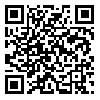BibTeX | RIS | EndNote | Medlars | ProCite | Reference Manager | RefWorks
Send citation to:
URL: http://rjms.iums.ac.ir/article-1-1460-en.html
Background & Aim:Auditory steady�state response (ASSR) is an oscillation in the electrical potential recorded from the scalp. In this study, the possible effects of shifting the response recording channel on 40Hz ASSR thresholds and their recording times were evaluated and compared.
Patients and Method:In this cross-sectional�study, 30 subjects with normal hearing (thresholds of 500 to 4000 Hz < 15 dB HL) whose ages ranged from 180to 30 were enrolled in the study after giving written informed consent. Right-handed subjects were selected. New chirp stimuli were presented to the right ear via inserted headphones using a two-channel EP recording system, the Eclipse.Thresholds for central frequencies (0.5, 1, 2 and 4 KHz) and their total recording time in the ipsilateral (recording from the right-EEG channel) and contralateral array (recording from the left-EEG channel) relative to the stimulated ear were evaluated at 40Hz repetition rate and averaged among 30 subjects. One-way ANOVA was used to compare the mean thresholds between channels in each frequency. Paired t-test was used for comparing average recording times between channels.
Results: The results of this study showed that thresholds and recording times of the contralateral 40Hz ASSR were better and shorter than that of the ipsilateral ones.
Conclusion: The present study indicated that in ASSR test contralateral recordings with 40Hz RF can probably be a better tool to objectively assess hearing thresholds in awake adults with normal hearing using ASSR




